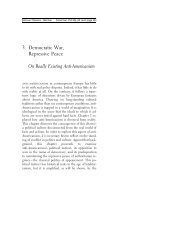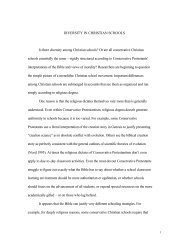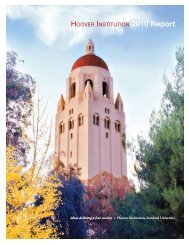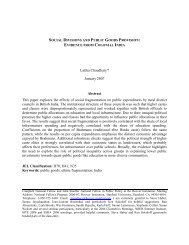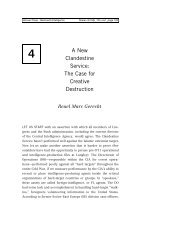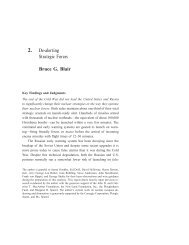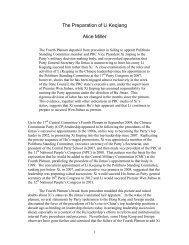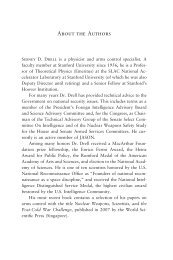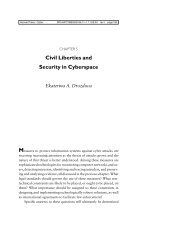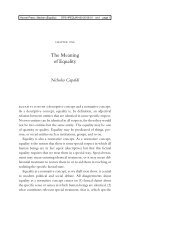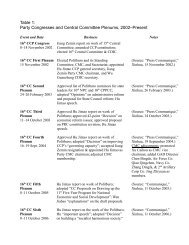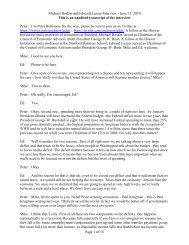Our Courage in Danger - Hoover Institution
Our Courage in Danger - Hoover Institution
Our Courage in Danger - Hoover Institution
Create successful ePaper yourself
Turn your PDF publications into a flip-book with our unique Google optimized e-Paper software.
y Harvey C. Mansfield<br />
An EnDAnGERED VIRTUES ESSAy<br />
<strong>Our</strong> <strong>Courage</strong> <strong>in</strong> <strong>Danger</strong><br />
Boyd and Jill Smith Task Force on Virtues of a Free Society<br />
www.endangeredvirtuesessays.com<br />
<strong>Courage</strong> is the virtue that enables us to deal with danger; so it may seem strange<br />
to compla<strong>in</strong>, as if on behalf of courage, that it is <strong>in</strong> danger. <strong>Courage</strong> loves danger,<br />
even thrives on it—and it does not compla<strong>in</strong>. The courageous person rather enjoys<br />
hav<strong>in</strong>g the odds aga<strong>in</strong>st him, as this gives him a chance to exercise his virtue rather<br />
than hav<strong>in</strong>g it lie dormant. For most people, courage is for emergencies we would<br />
rather not face, but the courageous few among us jump up eagerly when the tocs<strong>in</strong><br />
sounds. Why should we worry if the virtue required for deal<strong>in</strong>g with danger is itself<br />
<strong>in</strong> danger? <strong>Courage</strong>, it would seem, is safe <strong>in</strong> the hands of the courageous.<br />
Moreover, the danger to courage, we shall see, comes from certa<strong>in</strong> op<strong>in</strong>ions hostile<br />
to it. Yet courage seems to be the least <strong>in</strong>tellectual of the virtues, and as such the<br />
least affected by prevalent op<strong>in</strong>ion. We all know <strong>in</strong>telligent people without much<br />
courage and not-so-<strong>in</strong>telligent people who are very capable of courage. <strong>Courage</strong>,<br />
Aristotle says, has to do with pa<strong>in</strong>s and fears, the greatest of which is death; so<br />
courage is above all controll<strong>in</strong>g one’s fear of death, especially when there is great<br />
risk, when violent death is imm<strong>in</strong>ent, and when the stakes are high: courage is most<br />
shown <strong>in</strong> battle. In battle one can f<strong>in</strong>d courage on both sides. Yet despite grave<br />
differences <strong>in</strong> op<strong>in</strong>ion between one side and another, fighters on both sides can<br />
recognize cowardice among their own soldiers and courage among the enemy’s.<br />
Thus courage seems to be not only ubiquitous, as it is to be found <strong>in</strong> every<br />
society, nation, and race, and <strong>in</strong> every time present and past, but also universally<br />
recognizable and honored <strong>in</strong> all places and times. The Spanish conquistador<br />
Bernal del Diaz was amazed, bewildered, and disgusted by the Aztec practice of<br />
human sacrifice, but he could see and appreciate the courage of Aztec warriors. In<br />
his journal, he describes an <strong>in</strong>cident <strong>in</strong> which they mocked the lack of courage <strong>in</strong><br />
the Spaniards, when the latter refused to fight, with gestures the Spaniards easily<br />
<strong>in</strong>terpreted. Here two cultures, <strong>in</strong> op<strong>in</strong>ion and belief almost totally alien to each<br />
Harvey C. Mansfield • <strong>Our</strong> <strong>Courage</strong> <strong>in</strong> <strong>Danger</strong> <strong>Hoover</strong> <strong>Institution</strong> • Stanford University<br />
task force on virtues of a free society
other, had <strong>in</strong> common their recognition and appreciation of courage, on the basis of<br />
which they actually communicated with each other.<br />
Underneath the universality of courage, and <strong>in</strong> some way caus<strong>in</strong>g it, is the<br />
naturalness of that virtue, by which I mean its closeness to untaught human nature.<br />
<strong>Courage</strong> seems close to temperament, closer than the other virtues. Evidence for<br />
that lies <strong>in</strong> the dist<strong>in</strong>ction between the few who seek it and the many who may be<br />
brought to display it, if with reluctance. Only a few seem to be naturally courageous<br />
<strong>in</strong> temper, though, to repeat, they are to be found <strong>in</strong> every time and place. The<br />
temper they display has been named thumos, and is best described <strong>in</strong> the political<br />
philosophy and biology of Plato and Aristotle. Thumos is a quality of the soul (one<br />
cannot call it a virtue) shared by humans with animals, who show it when they<br />
bristle at a perceived threat to themselves.<br />
Thumos is spirited defensiveness—<strong>in</strong> humans, an awareness or perception of be<strong>in</strong>g<br />
threatened or slighted <strong>in</strong> one’s own sense of self-importance. As opposed to other<br />
animals, humans couple their thumos with a reason that announces or justifies their<br />
anger. Only humans are capable of anger. Dogs may bark <strong>in</strong>cessantly, but they never<br />
say why; we have to impute an <strong>in</strong>tention to them, lend<strong>in</strong>g them our anger for the<br />
moment.<br />
It is here that courage seems to lose its imperviousness to op<strong>in</strong>ion. The connection<br />
between thumos and reason is between, on the one hand, the most self-serv<strong>in</strong>g,<br />
assertive, and aggressive part of ourselves, together with the least rational and the<br />
most human-all-too-human, and on the other hand, our most rational and nobly<br />
human aspect, by means of which we express our devotion to someth<strong>in</strong>g above<br />
ourselves.<br />
For courage is always <strong>in</strong> the service of someth<strong>in</strong>g higher than itself; it defends, but<br />
it cannot itself constitute the end be<strong>in</strong>g defended. <strong>Courage</strong> serves and does not<br />
command. Sometimes it may try to command, as <strong>in</strong> the ancient military democracy<br />
(or aristocracy) of Sparta, <strong>in</strong> which courage was the virtue the rulers most prized.<br />
But that did not work. Aristotle relates that the Spartan men who believed they<br />
were rul<strong>in</strong>g were actually directed by their women, as often happens to the most<br />
manly men. And he asks, what is the difference between the rule of men directed by<br />
women and the rule of women? Sparta was the opposite of what it thought it was.<br />
Harvey C. Mansfield • <strong>Our</strong> <strong>Courage</strong> <strong>in</strong> <strong>Danger</strong> 2 <strong>Hoover</strong> <strong>Institution</strong> • Stanford University
Thus we see that although courage is always honored, it is not equally honored by<br />
every society. It was much more honored <strong>in</strong> Sparta than <strong>in</strong> a modern, commercial<br />
society like ours, where courage must cooperate with the spirit of ga<strong>in</strong> and of<br />
barga<strong>in</strong><strong>in</strong>g. In America, we do fight wars, and thus need courageous citizens, but<br />
we prefer to trade and prosper <strong>in</strong> peace without becom<strong>in</strong>g devoted to the passions<br />
of revenge and self-righteousness that are characteristic of thumos <strong>in</strong> its more<br />
s<strong>in</strong>ister mode.<br />
Thumos represents the human reaction to a threat. But when the reaction is<br />
expla<strong>in</strong>ed, the reasons given are usually partisan and sometimes offered <strong>in</strong> bad<br />
faith. Thumos represents the biased side of reason; also, however, the rational side<br />
of bias, for bias always has a biased reason to accompany it, provid<strong>in</strong>g cover for<br />
its nakedness. This quality illum<strong>in</strong>ates the truth that we are composite creatures,<br />
animals with bodies, rational be<strong>in</strong>gs with souls. We cannot help giv<strong>in</strong>g preference to<br />
our bodies and giv<strong>in</strong>g reasons to satisfy our souls.<br />
Thumos is thus the raw material of courage. It supplies the temper <strong>in</strong> every human<br />
be<strong>in</strong>g’s animal nature that compels him to desire to defend himself. Every human<br />
be<strong>in</strong>g has it as a k<strong>in</strong>d of immunity system for his self-importance—even babies and<br />
certa<strong>in</strong>ly women. (Women, like men, get angry, but are likely to express anger more<br />
<strong>in</strong>directly and subtly than men.) But some few have much more of it, and this is the<br />
spontaneous, natural basis for the extra, superlative courage of the courageous few.<br />
Aristotle, however, <strong>in</strong>sists that thumos by itself is merely animal spirit rather than<br />
courage, and he declares that those who fight not for the sake of what is noble and<br />
as reason dictates are good fighters but not courageous men. With this reason<strong>in</strong>g,<br />
he po<strong>in</strong>ts toward the conclusion that only the truly good are truly courageous,<br />
which runs contrary to the first impression that courage is a virtue because it<br />
is good <strong>in</strong> itself, regardless of the cause <strong>in</strong> which it is enlisted. This ambivalence<br />
reflects the nature of reason: when we say man is a rational be<strong>in</strong>g, that means man<br />
acts for a reason, any reason; but when we say someone is reasonable, we mean he<br />
has a good reason.<br />
Now we see the importance of op<strong>in</strong>ion <strong>in</strong> relation to courage. <strong>Courage</strong> acts <strong>in</strong><br />
behalf of an end that is good <strong>in</strong> the op<strong>in</strong>ion of the courageous person; from his<br />
own standpo<strong>in</strong>t, however, he th<strong>in</strong>ks he has a good or true op<strong>in</strong>ion. In his view,<br />
there would be someth<strong>in</strong>g <strong>in</strong>complete about his own courage if he were act<strong>in</strong>g <strong>in</strong> a<br />
bad cause.<br />
Harvey C. Mansfield • <strong>Our</strong> <strong>Courage</strong> <strong>in</strong> <strong>Danger</strong> 3 <strong>Hoover</strong> <strong>Institution</strong> • Stanford University
All the more must he th<strong>in</strong>k ill of someone else’s courage <strong>in</strong> a bad cause. From the<br />
standpo<strong>in</strong>t of the virtuous person—that is, one who takes the side of virtue—there<br />
is no objective ground where one can speak <strong>in</strong>differently of the courage of both<br />
sides <strong>in</strong> a battle. The only objective ground would be to have a good reason, if one<br />
can assume that good reasons have objective grounds.<br />
In our time, one op<strong>in</strong>ion that endangers courage is the relativism that pervades<br />
the more educated and <strong>in</strong>tellectual circles of our society. Anybody who has been<br />
to college learns that op<strong>in</strong>ion while he or she is there. Indeed, most of those<br />
aspir<strong>in</strong>g to an education hold that op<strong>in</strong>ion before they arrive <strong>in</strong> college, believ<strong>in</strong>g<br />
it <strong>in</strong> advance so that they can m<strong>in</strong>imize what they have to learn there. Relativism<br />
<strong>in</strong>sists that good reasons have no objective grounds, and it endangers courage by<br />
depriv<strong>in</strong>g it of the rational basis one might have for exercis<strong>in</strong>g courage.<br />
If there is no good reason to die for your country, then why do it? <strong>Courage</strong><br />
presupposes someth<strong>in</strong>g for which it is reasonable to sacrifice one’s comfort or<br />
well-be<strong>in</strong>g or even life. Without that, courage is sapped, and <strong>in</strong>dividuals who disda<strong>in</strong><br />
courage as irrational (because every human end is irrational) are weakened without<br />
it; they become will<strong>in</strong>g to trade their freedom, an <strong>in</strong>tangible good requir<strong>in</strong>g belief<br />
<strong>in</strong> its truth or validity, for comfort <strong>in</strong> material well-be<strong>in</strong>g, which seems satisfy<strong>in</strong>g<br />
because it is immediate, atta<strong>in</strong>able, and pleasurable.<br />
With that example, one sees that relativism is not a position with which one can<br />
rest satisfied; it tends to transform itself <strong>in</strong>to materialism or hedonism. Apparently,<br />
human be<strong>in</strong>gs cannot rema<strong>in</strong> <strong>in</strong> suspense, believ<strong>in</strong>g noth<strong>in</strong>g is true; they do have<br />
to believe someth<strong>in</strong>g. Materialism and hedonism claim that the only solid goods<br />
are bodily comfort and pleasure. Everyth<strong>in</strong>g else is relative and elusive, a “value”<br />
rather than a virtue. A value results from the activity of valu<strong>in</strong>g; it is a verbal noun,<br />
imply<strong>in</strong>g that a value (the noun) is what we value (the verb); a value is valued. Mere<br />
valu<strong>in</strong>g is enough to confer value.<br />
But then if relativism is correct, noth<strong>in</strong>g truly confers value; every so-called value is<br />
a delusion. When you th<strong>in</strong>k about it, noth<strong>in</strong>g is ga<strong>in</strong>ed by chang<strong>in</strong>g virtues to values,<br />
and someth<strong>in</strong>g is lost if you come to believe that you are more, rather than less,<br />
sophisticated as a result.<br />
When liberalism began, <strong>in</strong> the seventeenth century, it adopted an attitude of<br />
skepticism with regard to human knowledge of non-human nature. But it still<br />
Harvey C. Mansfield • <strong>Our</strong> <strong>Courage</strong> <strong>in</strong> <strong>Danger</strong> 4 <strong>Hoover</strong> <strong>Institution</strong> • Stanford University
elieved that human nature was knowable and could serve us as a guide. For<br />
example, liberalism doubted that we could know whether the “good life” was really<br />
good, but asserted that self-preservation, or mere life, could be known and was<br />
good. This meant that although life was a solid, observable good, any conception of<br />
the good life for which one might sacrifice one’s own life was dubious.<br />
Early liberalism therefore had a problem with susta<strong>in</strong><strong>in</strong>g courage, because courage<br />
requires an op<strong>in</strong>ion that the sacrifice of one’s life may be reasonable, hence that life<br />
under baseness or servitude is not a reasonable choice. The problem was typified <strong>in</strong><br />
Thomas Hobbes’s sarcastic def<strong>in</strong>ition of a battle as a “runn<strong>in</strong>g away on both sides.”<br />
But the early liberals dealt with this problem by seek<strong>in</strong>g ways to justify courage <strong>in</strong><br />
the service of freedom—for example, as the “sacred honor” that the signers of the<br />
Declaration of Independence pledged at the end of the document to expla<strong>in</strong> why<br />
they risked the “right to life” they announced at its beg<strong>in</strong>n<strong>in</strong>g.<br />
Gradually, however, and not surpris<strong>in</strong>gly, skepticism as to our knowledge of nature<br />
overcame confidence <strong>in</strong> the knowledge of human nature, and liberalism slid <strong>in</strong>to<br />
relativism, where it rema<strong>in</strong>s today, uncomfortable and restive with its own <strong>in</strong>sights.<br />
It sometimes tries to defend relativism as the doctr<strong>in</strong>e that makes for tolerance<br />
of those with whom we disagree: if nobody is right, and everyone agrees to that<br />
notion, all can co-exist <strong>in</strong> peace. But relativism is also known more menac<strong>in</strong>gly as<br />
“nihilism,” the doctr<strong>in</strong>e def<strong>in</strong>ed by Friedrich Nietzsche as the belief that “noth<strong>in</strong>g is<br />
true, everyth<strong>in</strong>g is permitted.” The “everyth<strong>in</strong>g” permitted of course <strong>in</strong>cludes war,<br />
even <strong>in</strong>cessant war.<br />
Relativism surely justifies fascism as well as liberalism, and even gives the nod to<br />
fascism. Why is that? Fascist values would seem to be preferable to liberal values<br />
because they result from more <strong>in</strong>tense valu<strong>in</strong>g than the weak “preferences” that are<br />
the best liberals can muster for themselves. When will decides rather than reason, a<br />
stronger will should justifiably prevail over a weaker one.<br />
Relativism thus endangers courage <strong>in</strong> two ways: by weaken<strong>in</strong>g it as <strong>in</strong> liberalism<br />
and by strengthen<strong>in</strong>g it beyond measure as <strong>in</strong> fascism. When courage is deprived of<br />
reason, it loses its raison d’être for sure, but it is also deprived of its restra<strong>in</strong>t. To be<br />
reasonable, says Aristotle, a virtue must follow a mean between defect and excess,<br />
<strong>in</strong> the case of courage between cowardice and rashness. The latter may sometimes<br />
look like courage, and people will applaud as if it were; but the look is deceiv<strong>in</strong>g.<br />
Relativism is a dire threat to courage and so to our country and our lives. The way<br />
Harvey C. Mansfield • <strong>Our</strong> <strong>Courage</strong> <strong>in</strong> <strong>Danger</strong> 5 <strong>Hoover</strong> <strong>Institution</strong> • Stanford University
around it is not to try to deny the special character of our country and to apologize<br />
for our devotion to freedom and greatness <strong>in</strong> a va<strong>in</strong> attempt at impartiality. It is<br />
safer and more reasonable to beg<strong>in</strong> from the universality of human virtue <strong>in</strong> order<br />
to come to understand the virtues we practice and hold dear.<br />
Other examples of op<strong>in</strong>ions dangerous to courage exist—the hostility of<br />
radical fem<strong>in</strong>ism, the American love of material well-be<strong>in</strong>g, the specialization of<br />
professionals, the <strong>in</strong>ord<strong>in</strong>ate fear of <strong>in</strong>security—but this is the ma<strong>in</strong> one. Noth<strong>in</strong>g <strong>in</strong><br />
either reason or experience suggests that relativism should be benign. To adopt it,<br />
and even to toy with it, is to risk our security for the goal of toleration that we say <strong>in</strong><br />
the same breath is groundless.<br />
Harvey C. Mansfield • <strong>Our</strong> <strong>Courage</strong> <strong>in</strong> <strong>Danger</strong> 6 <strong>Hoover</strong> <strong>Institution</strong> • Stanford University
Copyright © 2011 by the Board of Trustees of the Leland Stanford Junior University<br />
This publication is for educational and private, non-commercial use only. No part of this publication may be<br />
repr<strong>in</strong>ted, reproduced, or transmitted <strong>in</strong> electronic, digital, mechanical, photostatic, record<strong>in</strong>g, or other means<br />
without the written permission of the copyright holder. For permission to repr<strong>in</strong>t, reproduce, or transmit, contact<br />
Ms. T<strong>in</strong> T<strong>in</strong> Wisniewski (t<strong>in</strong>t<strong>in</strong>yw@stanford.edu)<br />
The preferred citation for this publication is<br />
Harvey C. Mansfield, “<strong>Our</strong> <strong>Courage</strong> <strong>in</strong> <strong>Danger</strong> (2011),” <strong>in</strong> Endangered Virtues, an onl<strong>in</strong>e volume edited by<br />
Peter Berkowitz, http://www.endangeredvirtuesessays.com.<br />
Harvey C. Mansfield • <strong>Our</strong> <strong>Courage</strong> <strong>in</strong> <strong>Danger</strong> 7 <strong>Hoover</strong> <strong>Institution</strong> • Stanford University
About the Author<br />
Harvey C. Mansfield<br />
Harvey C. Mansfield is the<br />
Carol G. Simon Senior Fellow<br />
at the <strong>Hoover</strong> <strong>Institution</strong><br />
and the William R. Kenan Jr.<br />
Professor of Government<br />
at Harvard University,<br />
where he has taught for<br />
more than forty years. He<br />
has held Guggenheim and<br />
National Endowment for the<br />
Humanities Fellowships, has<br />
been a fellow at the National<br />
Humanities Center, and <strong>in</strong><br />
2004 received the National<br />
Humanities Medal.<br />
Boyd and Jill Smith Task Force on Virtues of a<br />
Free Society<br />
The Virtues of a Free Society Task Force exam<strong>in</strong>es the<br />
evolution of America’s core values, how they are threatened,<br />
and what can be done to preserve them. The task force’s<br />
aims are to identify the endur<strong>in</strong>g virtues and values on which<br />
liberty depends; chart the changes <strong>in</strong> how Americans have<br />
practiced virtues and values over the course of our nation’s<br />
history; assess the ability of contemporary associations and<br />
<strong>in</strong>stitutions—particularly schools, family, and religion—to<br />
susta<strong>in</strong> the necessary virtues; and discuss how society might<br />
nurture the virtues and values on which its liberty depends.<br />
The core membership of this task force <strong>in</strong>cludes Peter<br />
Berkowitz (cochair), David Brady (cochair), Gerard V. Bradley,<br />
James W. Ceaser, William Damon, Robert P. George, Tod<br />
L<strong>in</strong>dberg, Harvey C. Mansfield, Russell Muirhead, Clifford<br />
Orw<strong>in</strong>, and Diana Schaub.<br />
For more <strong>in</strong>formation about this <strong>Hoover</strong> <strong>Institution</strong> Task Force<br />
please visit us onl<strong>in</strong>e at www.hoover.org/taskforces/virtues.<br />
Harvey C. Mansfield • <strong>Our</strong> <strong>Courage</strong> <strong>in</strong> <strong>Danger</strong> <strong>Hoover</strong> <strong>Institution</strong> • Stanford University



